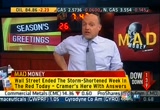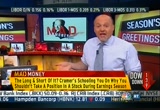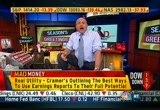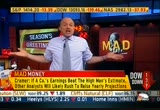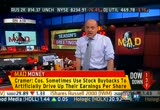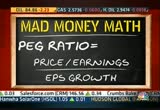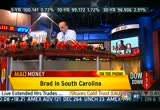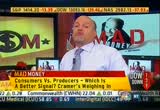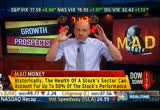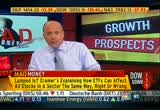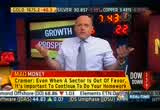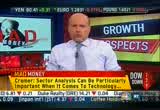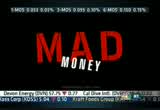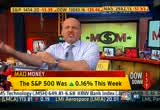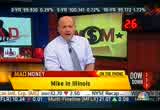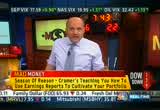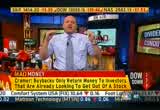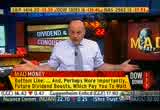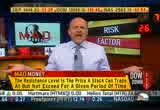tv Mad Money CNBC November 2, 2012 6:00pm-7:00pm EDT
6:00 pm
i'm jim cramer and welcome to my world. >> you need to get in the game. >> firms have been going out of business and he's nuts. they're nuts. they know nothing! >> i always like to say there's a bull market somewhere. >> "mad money." you can't afford to miss it. hey, i'm cramer. welcome to "mad money." welcome to cramirica. my job is not just to entertain you. i'm going to do some teaching tonight. so call me. earnings season. i dead earnings season. why? it's so many companies reporting at once, so much information being thrown at you, hard to know what's better than expected. what the real benchmark that must be beaten is. it's because i have a really bad
6:01 pm
back. i can't stand carrying all those printed out versions of the conference calls as i schlep from downtown manhattan where i do squawk on the street and work at the street to my studio where i do "mad money." but tonight i want to do something different. i got to help you this earnings season. i want to offer you a new way to use earnings season. day traders hijack a lot of the thinking. you're not trying to game the giving quarter. it's become so difficult to predict. and often the initial moves aren't even accurate because of the press conference or because something nasty just occurred in the overall market because of europe or something involved in the election. in other words, other than for those who are shorting or going long stocks ahead of the quarter, these earnings reports need a context to make you money. they can't be relied upon anymore because they aren't as predictive of future behaviors as they once were. they are a piece of the puzzle, a part of the mosaic. they are only one of very
6:02 pm
important parts of what predicts where a stock will go over the intermediate term. it is a teaching show. because i want you to know the metrics i'm using to pick stocks i talk about and recommend here you can follow along at cnbc.com. i want you to listen to these conference calls or read them in the transcripts. give you an opinion of what matters in these conference calls and how i let them factor into my picking stocks. i want this to show once and for all to tell you how to use earnings season as a way to evaluate your portfolio. figure out what you need to trim, what you need more of. let it help your stock selection. hone your way of thinking. not mine by yours. earnings season is incredible important for what it tells you about a host of issues. a report card. not just a trajectory the estimates. we're going to flesh that out. we can't dismiss earnings season. that would be totally wrong.
6:03 pm
we've just got to put it in context. here's how i use the reports we constantly refer. to first i aassess them for the predicted value for the year. to do that i try to discern where analysts go with their estimates after the company's reports do. they raise them, lower them, keep them the same? let's say apple is using a report that is better than not only the posting numbers that you can find on a lot of web sites but also beats the high man. some call it the whisper. the high man. the analyst with the most aggressively high estimates on the street. that will always cause a raising of the numbers for the rest of the year by everyone. if it is the end of the year for the numbers after that. i use that inincrease in earnings per share to try to figure out the increases from real business, actual sales. did they do better. not just the changes and share changes. i look more at the revenues than
6:04 pm
the actual earnings themselves. why is that important? a company can't change the sales line except by increasing demand, producing more, gaining more customers either at the expense of others or through better salesmanship, costs, acquisitions. they're doing a better job. they're working harder. they're working it better. but a company can easily change the earnings by buying back a ton of stocks. not the sales bun with you the earnings. simply changes the denominator. revenue growth in the quarter, particularly the holy grail accelerated revenue growth, arg, both quarter to quarter and year-over-year drive my thinking. they allow me to figure out future earnings growth. that's what allows me to know what to pay for the stock in the future. that allows me to make a determination of what the stock's worth. what i call the p.e. vacuum. price earnings mobile vacuum. when the average stocks sells at 11 times the s & p they say
6:05 pm
that's too expensive. it sells much more than the average stock. lazy thinking. what you need to do is figure out what that growth rate is using the earnings and revenue prism i just laid out for you. figure out how fast the company is growing previous quarter and andcom one and year-over-year -- you probably have a big bargain on your hands. we call that using the peg ratio. again fundamental of the show. the priced earn togz growth ratio a much more important ratio than the price to earnings mobile because it puts it into context with other stocks. we're always comparing other stocks on the show. i'm willing to pay a twice earnings mobile that pays -- better the price of the company. scarcity value of fast-growing companies. 70 times earnings for company
6:06 pm
that's growing at 40% gets me nervous. even if 40% growth is hard to come by. there are too many things that con go wrong with a stock when that happens. the converse is true, too. when i see a stock that sells for less than one times its earnings per share growth i begin to salivate because unless there are other factors going against it, the factors will be covered in the rest of the special show, i am drawn enough to that stock i have to find other reasons not to buy it. so bottom line, i use the actual earnings per share reports to figure out the growth rate of the stock. if the growth rate is high and the price to earnings multiple base of future projections is equal to or twice the growth rate that i'm interested in, enough to proceed with the rest of the work this special show will detape. i need to go to brazil d in sou carolina. >> caller: hey, jim, booyah to you. >> that's aggressive. i'll take that. go ahead >> caller: hey, jim, i'm just
6:07 pm
wondering how to best prepare for this earnings season in terms of online research resources. give me the anti-scoop of what yours looks like as you stay in touch of all the market updates. >> what i like to do -- first of all i watch cnbc. i'm not kidding. they cover earnings season better than anyone. i go to the web sites. the web sites are now so, so good. that literally will will have the analysts reports, a lot of projections. i like to look at the news stories to get a consensus about what the consensus is. then i look at annals reports the day after. all that has to be done if you're going to really sink your teeth in and feel very confident. start with the web site of the stock. dal in california, please. >> caller: booyah,jim cramer. i have a question what is meant by a reverse split stock? >> of the that means if there's a million shares let's say they do a three to one, make to it 300,000 shares. what is typically done, citi
6:08 pm
group did one of these. what it does, if you have like 300 billion shares you divide it by three, you got 100 billion. it does raise the price but it's illusory. you just have fewer shares. tyler in florida. >> caller: jim i'm going to give you a south florida booyah. >> i'll take that. i need to go there now always >> caller: sun is shining. actually it's overcast. but quick question for you. when you talk about the economy really booting off again it seems like you talk about it in terms of consuming and not producing. i'm thinking from the way i think about it you need something to be produced before it's consumed. i'm wondering why in terms of a growing economy you talk about consumption instead of production. that's what it seems like to me. >> i do. because in order to be able to raise price you need demand. if there's a shortage of supply, sure, that can mean something. but not if there's no demand, right? if you have a shortage of a supply at some price nobody
6:09 pm
likes you can't raise price. it doesn't mean anything. that's why we focus on demand on the show. a company that's got their earnings stars before you buoy it. use the eps to figure out the company's growth rate and take it from there. "mad money" will be right back. >> don't miss a second of "mad money." follow @jimcramer on twitter. have a question? tweet jim cramer #madtweets. or give us a call at 1-800-743-cnbc. miss something? head to "mad money".cnbc.com. hi. i'm henry winkler.
6:10 pm
and i'm here to tell homeowners that are 62 and older about a great way to live a better retirement. it's called a reverse mortgage. [ male announcer ] call right now to receive your free dvd and booklet with no obligation. it answers questions like how a reverse mortgage works, how much you qualify for, the ways to receive your money, and more. plus, when you call now, you'll get this magnifier with l.e.d. light absolutely free. when you call the experts at one reverse mortgage today, you'll learn the benefits of a government-insured reverse mortgage. it will eliminate
6:11 pm
6:13 pm
madmoney.cnbc.com. welcome back to "mad money" special earnings season companion show. how not to be overwhelmed by earnings reports and put them in perspective so you can profit from them in an informed and confident way make money at home. we just went over how i like to use them themselves to figure out the growth rate. figure out whether it's too expensive or too cheap against its sector and the rest of the market. the next way i use the earnings report, something i call the ettf of the organization of the stock -- i measure the stocks's earnings growth and quality of the earnings growth against its cohort. then i figure out whether the whole cohort is worth owning or for getting about. that's right. for most than my more than three decades of investing i've send the fact the sector is important when you're sticking a stock. it matters. historically a stock matters
6:14 pm
maybe 50% of its stock performance. now because so many people trade through etf and they have become popular for individuals and hedge funds to make decisions about stocks take quick action the sector has superceded earnings at times. often it's made earnings all but an afterthought for individual companies. take for example the way the banks traded the last few years. it didn't matter for the most part whether a bank had strong earnings, weak earnings. if the bank was -- people didn't want to own it. it didn't matter how well a bank did. a bank like wells fargo, u.s. bancorp -- morgan stanley with tremendous exposure to the continent. that's why at times i've had to dismiss the earnings per share gates entirely at the moment if the cohort was radically out of favor. but i never just forgot them. instead i try to choose --
6:15 pm
figure out which one's ten at times, break the sector of the gravitational pull and which one can shine. if the sector falls back into favor i got to be ready. in bottom 2009 remember the march bottom generational? we've seen many sectors retail and individual stocks within those sectors outperform. i like to listen to the earnings of all the retailers. at given times i am wrapped by the groups doing the best. by far the top performers during this period have been the discount stores, particularly the dollar stores. dollar general, dg, and dollar tree. when i see the markets tied at money going to retail i go back to my earnings report memory and i reach for these two. i know they have the most earnings momentum. i only know that because i keep listening to the calls. even though the group may have been out of favor of late. so when everyone piles into the retail etf which i use the rth, i am in there with the ones with the best momentum. similarly i've been going to ross stores, tgf and bed, bath
6:16 pm
and beyond with these sectors when i grab a sector. because they have the most inexpensive earnings momentum. there's another strategy for more sophisticated investors i want to let you in on, too. when i know which are the best of the best because i focus on the calls and a huge amount of money is poured into a given sector, i like to hedge my bets, sell the etf and buy the best performers in the etf according to my earnings per share work. that way if the move takes a turn for the worst we get a large macro number, government number or weakness out of europe i can lose less than people playing the earnings momentum game because i own the best and i am short the rest. sector analysis is particularly important technology. people confuse this gigantic group of stocks which comprises more than 15% of the s & p 500 constantly. tack is a grotech is a whole gr
6:17 pm
markets. infrastructure stocks, aaccept blers, each have a separate growth rate. here i like to look at the earnings per share growth rate of the companies i follow versus the individual prices of the sector. the sector growth rate doesn't work even though people keep trying to use it. cloud stocks, for example, are highly valued. price rates to growth earnings are extreme. that means there's no room for error, a chunk that could upset the growth rate. in 2011 one of my favorite cloud stocks -- it got pancaked and stayed ugly for a long time. why? because it underperformed its portion of the technology sector even as its growth rate would have been outstanding for say a personal computer-related stock or a disc drive, a semiconductor or cell phone company. these days knowing what the sector is isn't enough. you need to note sub sector. you need to know how your company stacks up against the growth rate of that sub sector, and you need to have a good handle on whether that larger sector is in favor or if it
6:18 pm
isn't. the bottom line, nothing's worse than owning a bad stock supplied by weak earn ngz a bad sector neighborhood. nothing's better than owning a good stock in a great neighborhood. if you do the not measure the stock's earnings against the sector's growth and don't determine whether the sector is in favor verses out of favor the earnings report better than expected or not won't mean a thing. when we return i'm going to give you several more ways to use these earnings reports in the context of stock spitting, not just trading, which i have come to see as pretty much of zero sum game. stay with us. >> let me tell you how i see it. hey creper, where's the bull market today? >> honey, look at jim cramer. >> mr. cramer, booyah.
6:19 pm
6:20 pm
an entirely new pursuit. how did i get here? dumb luck? or good decisions? ones i've made. ones we've all made. about marriage. children. money. about tomorrow. here's to good decisions. who matters most to you says the most about you. massmutual is owned by our policyholders so they matter most to us. massmutual. we'll help you get there. we don't let frequent heartburn come between us and what we love. so if you're one of them people who gets heartburn and then treats day after day... block the acid with prilosec otc and don't get heartburn in the first place! [ male announcer ] one pill each mo 24 hours.
6:21 pm
6:22 pm
not tomorrow's grade. to see what they tell us about the growth of a stock as well as inside the sector as well as the sector's gravitational pull. best house, bad neighborhood. now we're got to dig further than the headlines to discern what else on the conference call or in reaction to the call that can help us make some money. we don't stop with just the call. what else is important to listen to on these? the wall street analysts we tell you the most important predictor of future earnings is the growth margin. what's left after the cost of sales are subtracted. lemonade stand. the cost of goods sold there are pretty simple to understand. the lemons and yeah some sugar. figure out how much those cost you, subtract it from what you charge you have the gross margin. we can't have loss over the cost of the table. time it takes up to make up the sign. labor behind the stand. what you pay someone else behind the stand. we try to figure out the cost of
6:23 pm
the goods sold whether they are going up or down. that's the inflation-deflation come up component. how much leverage there is. if you have all the labor and costs accounted for how much business can you do? the one they always like to think of. there's not a lemonade stand but it's pretty well-known it's chipotle. it has legend earl fabulous gross margins in each of its stores. they have labor, food and customers. the more customers they can serve poor hour the more leverage they have. the keys to the gross margin reports, the cost of the guac, beef, tortillas, chicken, labor and customers they can push through in a given day. of course there are dozens of other inputs, advertisements and leases to the store. as little as turnover as possible because the cost to training employees is tremendous. a huge obstacle to making a lot of of money. that's something the former ceo of costco made clear to us on many occasion on this show. he was legendary for paying his employees the most and treating
6:24 pm
them with the best of benefits because it's so important to keep them happy so the firm doesn't constantly have to train new people. new people are not known to the regular customers who like to see the same old hopefully smiling faces. new people cost too much money. same goes for chipotle. with the most talented people quickly given promotions and opportunities to run more stores. mcdonald's similarly often praised for its gross margin improvements. because it has the best market muscle it can get low-cost goods and it's got good leases but also because it has the technology, innovator on a quick scale. they got huge leverage per hour. gross margin comes into play in every industry i follow always in different ways. of finance the key to the gross margin is less to do with the cost structure of the company and more to do with the inventory conditions of an industry or a given company. now we're talking tech. semiconductor companies for example often produce flat out
6:25 pm
24/7. but at times demand way-- wanesd it gets glutted. they have to cut price which lowers their gross margins and makes the earnings too volatile to predict. therefore a high-priced earnings multiple. that's when you see preannouncements when there's too much inventory. we like companies with consistent growth. we don't like the inconsistent growth that tech gives us and pay lower mobiles for that. used to pay higher mobiles. no one could handle that glut that happens once or time a year. steel should be lumped into tech. some countries like china cause a glut in the system. prices crash. i like to listen to commodity calls to see if inventory is building anywhere in the system. fit is i can tell that the gross margins are coming down and i got to get you out of those stocks quicker than i do. aluminum, steel, copper. i got to work faster. don't you believe for one moment
6:26 pm
it's just the commodity producers affected by these gross margin issues. every single pharmaceutical call for you. a drug company with a patent cliff meaning its drug company off patent will plummet in price it scares me and i tell you to get out. i think it's going to trade at a very low multiple of mobile earnings even if it traded as a high one in the past. i got to keep you out of it. very few drug companies are immune from this. i steer clear them as best i can until everybody knows about the patent cliff. then i ca go back. finally there are gross margins of the oil service companies. these are the hardest. they're difficult because you often have to figure out several numbers for the gross margins, how much it cost to drill, to get in and out of the ground, to ship it, to refine it. those are complicated companies. many companies in this industry have tried to break themselves up to make it easy for guys like me to figure out the gross margins instead of having to be a blend they got to unwrap. i care chiefly about finding costs and about end market prices. that's why the natural gas
6:27 pm
companies for example traded at discounts in the pure oil companies. because the end market price of natural gas has just been so low for so long, and the end market price to crude has been so high for so long. that's what draws me toward a company like an eng or continental. they've got expensive prices when they get it out of the ground. bottom line, the key component after figuring out the earnings per share trajectory and its growth related to the cohort is to figure out the future gross margins. something that is uniquely calculated only by listening to the conference calls. can't get that in the headlines or any of the press reports. if you don't know the direction of the gross margins you won't know the direction your stocks are about to take in your portfolio. it is an integral part of the homework. if you don't calculate it yourself you got to get it from somebody. be sure to read from the analysts who do. brad in ohio, please brad >> caller: booyah from gerard, ohio, jim. >> got to get there. i haven't been there yet. i'll get there.
6:28 pm
i promise myself >> caller: thanks for taking my call. the question is as an investor interested in specialty retail, i understand that the fourth quarter is definitely the quarter with the most significant earnings. >> right. >> caller: but how should one evaluate these company's first quarter earnings? >> you know what? i frankly don't care about the first quarter for retail. it's only the fourth quarter i care about. first quarter isn't meaningful. my dad sells gift wrap. gift wrap is one of those things you realize what the seasons are and valentine's day doesn't move the needle like christmas. i like the holiday season, hanukkah. what i try to do is say i'll make my judgements from retail on the fourth quarter. don't make any on first quarter. it's all that matters. i wait to hear those quarters and then i make my judgements for what the next year is going to bring. mike in illinois, mike >> caller: this is mike in the windy city giving you a chicago bears bah bah buoy. >> bears are constant.
6:29 pm
>> caller: if i have a short stock how long do i have to cover that short? >> forever. that's one of the great things about shorting. stay short for however you want. if the stocks goes up they may ask you to put more money up, though. that's where people get squeezed. you do the to dig deep if you want big margins. gross margins will guide you in figuring out the direction of the stock. some things you'll only find in the conference call, not the headlines. gross margins, that's on the call. stay with cramer. >> jim cramer looking out for you. >> thank you, sir, for helping us average joes on the road to financial freedom. >> thanks for all you do for us small investors. >> thanks for helping all us home gape gamers. >> thanks for sharing your knowledge with the every man. >> anywhere, anytime, any place. answering the call of america weeknights 6:00 and 11:00
6:30 pm
eastern on nbc. >> on squawk box jack welch thrives. on the race for the white house, the nations headed for the fiscal cliff, prospects for the economy and more. jack's in the box, squawk box, monday on cnbc. what about updated equipment? they can help, but recent research shows... ... nothing transforms schools like investing in advanced teacher education. let's build a strong foundation. let's invest in our teachers so they can inspire our students. let's solve this. we don't let frequent heartburn come between us and what we love. so if you're one of them people who gets heartburn and then treats day after day...
6:31 pm
block the acid with prilosec otc and don't get heartburn in the first place! [ male announcer ] one pill each morning. 24 hours. zero heartburn. and sounds vying for your attention. so we invented a warning you can feel. introducing the all-new cadillac xts. available with a patented safety alert seat. when there's danger you might not see, you're warned by a pulse in the seat. it's technology you won't find in a mercedes e-class. the all-new cadillac xts has arrived, and it's bringing the future forward.
6:32 pm
6:33 pm
expected earnings report to a good trade, seems to be a dominant way of thinking but how to put these reports for work for you. sort the best stocks and prune those that need to go. we figured out how to compute the growth rate of a company whether it's too expensive based on that growth rate, something at jim cramer on twitter i keep getting that question. we've explained the importance of sector analysis as part of the earnings report and learned how to focus on gross margins, something that can only come out of the conference call. now we must address two more pieces of the earnings puzzle, dividend growth and home run potential. from pretty much the time since i first bought stocks in the late 1980s until fairly recently, dividends were an afterthought. ever since i had my hedge fund. companies became enamored of buy backs as way to return money to existing shareholders. to me it's oxymoronic. you're only returning money to the parting shareholders. buy backs extreme cases,
6:34 pm
autozone work, novellas. executives who get paid for hitting certain earnings-based targets. they do that by shrinking the float through buying back just enough stocks to make it where the share can't count is divided into the earnings per share it beats the compensation benchmark they were supposed to hit. only a very handful of buy backs do what they're really supposed to do, make it so there are far fewer shares out there, so they can drive the stocks higher if the earnings are excellent. the buy back that accomplishes that goal, count them on one hand. most buy backs turn out to be a huge waste of money as companies spend an eye beg gigantic amoun rebuying. they don't know anything about stocks just their own business. what are the good companies doing now? they are offering more and more bountiful dividends. a much better sign than a buyback. buy backs are indefinite. dividends are an out loud,
6:35 pm
declaration of long-term confidence. now low rates seem to be upon us for some time courtesy to small economic embers. dividends can provide a rate of return that certificates and deposits you keep trying to make money with but can't. stocks present more risk than carbon dioxi than cds. but if you reinvest the dividends you can augment your return to the point where you are far exceeding a return on bonds. dividends are so important they've been responsible for almost 40% of the s & p 500 return the last ten years. they're also the main reason why the dow jones industrial average which is above average dividend yield far outperform the s & p 500 in 2011. 5% capital return, how about making a total 8% if you reinvest dividend, a safety net
6:36 pm
in bad times and trampoline during the good. we listen for calls that tip management's hand on the dividends. to tell us there is enough excess cash available to boost that dividend. perhaps several times in a short period of time. that's what we heard from general electric in 2011. that was on every conference call they mentioned it. conversely, if a company signals it is going to buy back even more stock and the buy back is ineffective in reducing the share cap, you got to look at how many shares it had year before year before year before you should presume the buy back is all about management and enrichment. seeking to contain the damage from the shares and options offered to management. a lot of tech companies do it. i regard it as disgraceful. no one else thinks that. i don't care. i know what i see. these days if a management doesn't indicate it might boost the earnings on the dividends call count me out unless they have ferocious earnings power like apple i'm willing to overlook the indiscretion. we need to look for a break out,
6:37 pm
something new on the conference call, that can serve as an upcoming catalyst. you need a catalyst to buy a stock. i scrutinize calls not so much for what has happened. that doesn't interest me. but something that will happen. if i hear something that sounds like it can propel a stock in the future i am anxious to buy it. if there's a selloff because someone is disappointed the company didn't beat the estimates by enough or didn't guide high enough to please the momentum fund to the stock i got my opportunities. what are the exampleses i look for? pharmaceutical companies often telegraph what might be going into stage three. meaning what drugs might be near final approval. they often tell you about expanded usage on the labels for drugs. allergan has told you more about the future on its call than any other. it has been a terrific buy. every time it sells off after earnings because of the upcoming cat catalyst. celgey give you a call that
6:38 pm
tells you what's coming up. tech companies often tip their hands about upcoming product cycles. pipeline companies, key creators of dividend wealth we talk about all the time, they tell you about upcoming expansion that could be added up to earnings. the exploration production companies almost always tell you what prospects they're looking for. when you might hear some really good news on these calls. i wait for the oil futures to go down then i can stockpile the oil. last year continental resources, gave you chance to get in before we had gone after the bakkan. talking about how storms had kept their drilling down, the storms ended. nobody cared. and then the stock took off when they told you that business is big and booming. the bottom line, we look for signals about the future of these calls, particularly about upcoming catalysts that will move the stocks later on, making them solid buys on any shorts because it wasn't better than expected. we try to measure confidence about cash flow can ultimately
6:39 pm
trigger rising dividends. the best source of wealth that stocks can give us. remember dividends pay us to wait for things to get better. there's no better way to find out about the prospects for increased dividends than to listen in on the earnings call. stick with cramer. let's go to kentucky. >> reporter: hillbilly booyah. >> a hillbilly booyah. holy cow >> caller: here's a big las vegas booyah. >> staten island new york hey now forget about it booyah. >> boston. >> nashville. >> michigan. >> california. >> booyahs come from all across america. let cramer help you channel yours. "mad money" with jim cramer weeknights. from busser to waiter to chef before opening a restaurant specializing in fish and game from the great northwest. he'll start investing early, he'll find some good people to help guide him,
6:40 pm
6:42 pm
6:43 pm
are the crucial thing. here's the deal. they don't have to be shoot first ask questions later experiences. actually the opposite. conference calls are ask questions, ask questions, then ask some more questions. and only then maybe take action. we are asking specifically about what the growth of the earnings per share might be and how expensive that would make the stock versus other stocks in the sector. and maybe other stocks in the market as a whole. usually regarded as being the s & p 500. we want questions answered about gross margins, whether they're going to be increasing. why we have to judge if earnings estimates might be beaten in the future. we are looking for signs of dividends, these days the most important indicator of a company's health might be boosted. we are looking for catalysts to pro propel a stock higher after earnings season is over. so important at a time when so many stocks sell off in knee jerk fashion. simply because some company didn't beat somebody's estimates that might not have been informed anyway. there are two more items to be
6:44 pm
gleaned from the earnings reports and conference calls, new once i've had to add to the equation because of structural changes in the stock market over the last few years. the first is geopolitical risk. i never really cared about it. america was king. geopolitical risks linked exposure. not just to the rising price of oil jostled by the middle east. always an issue. but linked exposure to the sovereign debt and banking debt issues of europe. how much the exposure might be to the chinese company. for example for most of 2011 it was possible to own banks. they were perceived as linked to the troubled euro and its -- overstressed french and spanish counterparts well we got our heads handed to us. simply owning tech? when tech is often to be considered heavily dependent upon europe? as much as 20, 25% of their earnings for tech are derived from the continent. typically it's been deadly.
6:45 pm
we know this because the business don't dodge it. the analysts won't let them get away with it. all you got to do is listen to q&a. at the end of the call if you're a company with european exposure you'll hear one of out of every two or three questions about europe. asia one out of every two questions about china. you want some preventative earnings season medicine go through previous calls of the companies. if the questions are about europe you know you're probably going to be in for a bruising next time. that's what the analysts are focusing on. that's what they're forcing the companies to talk about. as correlated with europe that many tech and banks stocks are, go into the earnings calls of caterpillar. joy global, cummins, peabody, dell, owning these stocks is like owning a piece of the great wall of china. it's got to be such a pervasive worry i have seen downgrades of
6:46 pm
stocks like yum because it's got a huge chinese business through kfc. and coach which has been expanding aggressively in china because of worries about -- not paying attention to what the chinese are dumping in our markets is like taking your life into your own hands. how do we find out all these issues? something as diverse as corning, 3 m, march to the drum. it's all in the pes pestering by the analysts. pretty simple. listen to call. don't hang up until you have heard the last question. read the transcript so you can tell how worthy analysts are about the market that didn't move the needle a few years ago. one final piece, earnings season you have to weather something that i've never talked about before. and we got to do this before we're done fortnight. one that's become obvious to anyone who watches this show regularly. you have to know the chart of the stock ahead of the quarter. so often we have charters who
6:47 pm
trace out what a pattern might be and where a stock could break down or break out if it hits a certain level. why is it so important? you got to recognize the charter's the expectation game and pick the graph form. when you hear has that expectations were too high going into the quart, you have to recognize the chart was the gauge of the expectation. you looked at the chart. that tells you where the expectations are on. often a chart rallies to a particular level in advance of the quart. if the quarter isn't up to snuff the stocks will get hammered because of a chart failure. i don't want you to react to this kind of chartmanship. i want you to use it in your favor which is why i save this chart for last. you know what's an ideal stock to buy? one that has rising earnings per share growth with rising gross margins, a potential for dividend increase and good news on the horizon. that gives you the chance to get in at a terrific price, one that you wouldn't otherwise be able to get because of the chart.
6:48 pm
why is it so important? because no journalist is ever going to attribute the decline in a stock to the chart. yet so many hedge funds are reacting entirely to that chart and taking silly action because of it. remember i'm not a chartist. but i play like one when i have to. the bottom line, if the question and answer on the conference call revolves heavily around their risks or currencies or crisis in europe or asia or anywhere else be prepared for a hammering this current quarter. if a stock goes down that you think should be going up, it might be the chart talking. chart telling a tale and giving you a chance to get in cheaper than you might otherwise have a chance to do. now you are ready for the rest of earnings season. go get em and tell em cramer sent you. dean in california. dean. >> caller: hey, jim, how are you? hello from beautiful marin county. >> is it gorgeous up there. how can i help? >> caller: listen. i check my stocks at the end of the day. usually you'll see a little blush on the news headlines that
6:49 pm
says, for instance, in particular stock has a close or a buy imbalance at the end of the day and thep they'll name the shares. >> right. >> caller: what i want to know what do these close of balance buys mean and do they have implications for the follow day's trading? >> no. i don't think you have to worry about it. more distractions. a lot of the buying may be etf related or market on close program. it's confusing to people. we care about the fundamentals. maybe it affects the chart, maybe it doesn't. i don't care about the chart that much but i know many people do. that would matter only if you were a big broker working 100,000 share orders trying to get people the best price at the end of the day. it's all in the conference calls, everybody. a company's earnings release is much more than that. i need clues. clues that will signal where a company is going and i like to look at the charts. and well, call me. call cramer. back after the break. >> constantly taking the pulse of the market, you need someone
6:50 pm
6:51 pm
in light of having a child that needs you every moment. i wouldn't trade him for the world. who matters most to you says the most about you. massmutual is owned by our policyholders so they matter most to us. if you're caring for a child with special needs, our innovative special care program offers strategies that can help.
6:53 pm
now let's see some mad mail and mad tweets @jimcramer on twitter. hello, jim. you often encourage home gamers to do their homework. although i dvr every episode of "mad money" i don't remember what you suggest should be involved in doing our homework. my version is mostly listening to every word on "mad money" and checking price movements and charts. what else do you suggest we do? i wrote a whole book about how to do it with "mad money." back to the starter. you hear a stock that you like, you decide you want to get to know it. you go to the web site. the web sites these days have almost everything. you read about the last three quarters. you know what i like? i like to read the annual report. then i like to call up what the analysts are saying. i like to see what could be in the pipe, what the dividend is. these are all part of the process long before i would think of pulling the trigger. i also like to think what would make me sell it. if they missed certain things or did certain things that the
6:54 pm
stock went up so high, a lot of things for homework. it all starts with the web site. here's once from trace, no doubt the, well -- hi, jim, as we all know the department of defense is planning to downsize the military over the next few years as we also conclude our business in afghanistan. do you believe the large amount of military personnel and contracts and personnel will flood the market and increase the demand for goods? no, trace, i don't think it will move the needle. the army and navy, they don't move that fast. in anyway there could be a peace dividend where we got to cut the deficit. i don't think you should look at this issue in a way to make money off it. it's really not a needle mover. it can be negative for a lot of the defense companies as we know. they've been under a cloud because of these cuts. here's one from danny in new york. hi, jim. i have heard you say when considering the playing the down side of an equity you would short the stock rather than allow a put. please elaborate on your
6:55 pm
reasoning for this. >> if i have created any misperceptions that i favor shorting stocks it is completely out of character with all my books and what i used to do with my hedge fund, when i was working for people at goldman sacks or trading for myself. i always do puts. i rarely do shorts. i was a victim of some horrible short squeeze that is lost me a ton of money. use puts. i don't care if there's a premium. let's go to some tweets. here's one from b. kelly 019 @jimcramer. cover calls allow me to print money out of large positions without having to sell. why do you hate them so much? here's the answer. i got to it will you something b kelly 019, i hate trapping my off side. i hate cutting off my off side. let's say something goes wrong. you sell the stock, you're really vulnerable to a takeover then because you're still short the call. never ever ever cap your up side. that's always been my rule.
6:56 pm
i would never sell a put. that i think and i've seen it in '87, i saw that put people out of business. i saw it again in 2009. put people out of business. trust me on this. i have been around for just more than three decades. trust me on this. okay. here's one from jeff. booyah, jim, what is your strategy at looking at hot stocks in general? all i care about is government pay. if the government's not in the mood to be able to pay hospitals, stingy toward hospitals i don't want to touch them. there's not enough hospital mergers that can still be done without the government stepping in and saying we get to block that. so with hospitals if the government's on your side, i could be a buy. if the government's against you, stay away. but stick with cramer. >> stay connected to cramer on madmoney.cnbc.com. pinch... and zoom... in your car.
6:57 pm
6:59 pm
what if she's not home? (together) she won't be happy. use ups! she can get a text alert, reroute... even reschedule her package. it's ups my choice. are you happy? i'm happy. i'm happy. i'm happy. i'm happy. i'm happy. happy. happy. happy. happy. (together) happy. i love logistics. i like to say there's always a bull market so
212 Views
IN COLLECTIONS
CNBC Television Archive
Television Archive  Television Archive News Search Service
Television Archive News Search Service 
Uploaded by TV Archive on

 Live Music Archive
Live Music Archive Librivox Free Audio
Librivox Free Audio Metropolitan Museum
Metropolitan Museum Cleveland Museum of Art
Cleveland Museum of Art Internet Arcade
Internet Arcade Console Living Room
Console Living Room Books to Borrow
Books to Borrow Open Library
Open Library TV News
TV News Understanding 9/11
Understanding 9/11
